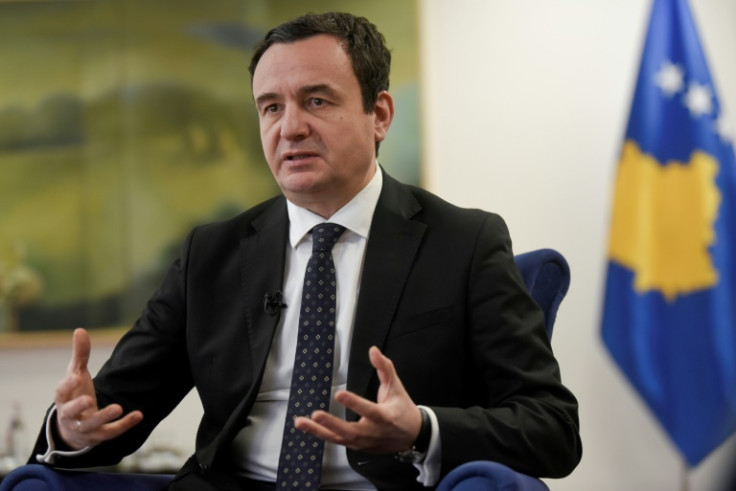'We Can't Be Blackmailed': Kosovo PM Not Giving In Against Serbia

With pressure mounting from US and European allies to strike a deal with arch-rival Serbia, Kosovo's Prime Minister Albin Kurti vowed on Wednesday to resist any attempt at "blackmail" in the face of a looming deadline from the West to reach an agreement.
For months, Western envoys have been shuttling between the Serbian and Kosovo capitals in a fresh diplomatic thrust to resolve long-simmering tensions nearly 25 years after the war between ethnic Albanian insurgents and Serb forces triggered a NATO bombing campaign that ended the fighting.
But more than two decades on, Belgrade still refuses to recognise its former Albanian-majority province's government, and with the backing of powerful ally Russia has prevented the territory from entering an array of international institutions, including the United Nations.
With war in Ukraine unleashing new uncertainty in Europe, the US and EU appear determined to iron out an arrangement between Kosovo and Serbia to end years of crisis in the Balkans.
According to Kurti, Kosovo is now facing a March deadline to come to some sort of agreement with Serbia, despite a mountain of hurdles and basic disagreements poisoning even the semblance of relations between the adversaries.
"Our greatest obstacle is the insistence and quest of Belgrade for [a] time machine. They want to go back in time and it's not possible," Kurti told AFP during an interview in Pristina.
"Kosovo is an independent country and it will be better also for Serbia to recognise Kosovo," the prime minister added, saying such a move would likely facilitate Belgrade's integration with the European Union.
Amid the deadlock, Kurti insisted the onus rests with Serbia, which he labelled an "autocracy" that has fostered close ties with the Kremlin in Russia and continues to destabilise southeastern Europe.
Washington, however, appears to be leaning heavily on Kurti and his government to relent on key issues, with the US embassy in Pristina this week calling for the immediate establishment of a long-tabled proposal to form the so-called Association of Serb Majority Municipalities.
Hours after the release of the statement, a meeting on Tuesday held by the US embassy to discuss the proposal was not attended by Kurti, hinting at rising tensions with Kosovo's steadfast ally.
He has long been an opponent of the arrangement, saying the association would effectively give Serbia another ethnic enclave in the region that could be used to undermine his government.
"We cannot be blackmailed. We cannot be afraid. We are courageous people and what we demand is fair treatment, equality and mutual recognition," he told AFP.
"It is not fair to pressure the most pro-European, pro-American and democratic country in the Western Balkans," said Kurti. "Pressure should be on Belgrade."
On the other side, Serbia's President Aleksandar Vucic says his government is also under the gun to reach a deal.
In a televised national address last month, Vucic said he had been handed an ultimatum from Western countries to normalise ties with Kosovo or face measures that would do "great damage" to his country.
"(They) said -- you must accept this plan, or you will face the interruption of the process of European integration, the halting and withdrawal of investments and comprehensive economic and political measures that will cause great damage to the Republic of Serbia," Vucic told viewers.
At first glance, Kurti and Vucic seem to be the most unlikely of leaders to hammer out an agreement, with the Serbian president publicly referring to his Kosovo counterpart as "terrorist scum".
"I can speak about the stances of the president of Serbia, but not of his level of education," Kurti told AFP.
Once dubbed "Kosovo's Che Guevara", Kurti went from a dread-locked activist leading rowdy street protests to an uncompromising member of the opposition known for unleashing tear gas canisters in parliament, before becoming prime minister.
Today he's in his second stint as prime minister after scoring a landslide win at the polls in 2021 and has done little to shed his radical dedication to defending Kosovo's sovereignty, with Western diplomats frequently complaining of his stubbornness in private.
But Kurti remains unapologetic in his quest to secure a stable future for Kosovo.
"Democracy and the republic must be defended," he told AFP. "This is not easy, but there is no alternative."
© Copyright AFP 2024. All rights reserved.




















